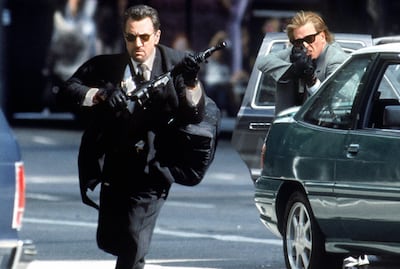In movies, there's always a fine line between an homage and a downright rip-off. But the crime film seems especially guilty-as-charged, with the new frequently copying the old. This week sees the release of Den of Thieves, Christian Gudegast's B-list movie which stars Gerard Butler, Curtis "50 Cent" Jackson and O'Shea Jackson Jr. Set in Los Angeles, Butler plays "Big" Nick O'Brien, a dissolute member of an elite unit of the L A Country Sheriff's Dept. He and his team come up against a gang of ultra-professional ex-military armed robbers who scheme to steal from the Federal Reserve.
Stage any violent heist movie in modern-day Los Angeles, and you inevitably come up against two titanic films from 1995 – Michael Mann's Heat and Bryan Singer's The Usual Suspects, which won Oscars for star Kevin Spacey and writer Christopher McQuarrie, respectively. Even now, twenty-three years on, these reign supreme over contemporary crime films, so arguably Gudegast's idea to thieve from both is questionable. True, he can cut an action sequence, but attempting to deliver a shoot-out amid stalled L A traffic brings to bring to mind the scene in Heat, when Robert De Niro, Val Kilmer and their gang make their escape along the city streets with military-like precision.

Likewise, taking your characters to the San Pedro docks will always bring to mind The Usual Suspects, where the violent finale unfolded. But there is worse larceny afoot – not least a sting in the tail in Den of Thieves that recalls The Usual Suspects's wonderful coda, where the rug is pulled from underneath the audience's and cops' feet alike. What we have instead, is a faded photo-copy of a crime movie or a counterfeit; you can almost visualise the moment as Gudegast went into the pitch meeting saying, 'It's like Heat meets The Usual Suspects – only with Gerard Butler!'
Is it this hard to make an original crime move? Even Heat itself was a remake of Mann's earlier (admittedly inferior) film L A Takedown (1989), as he developed the cat-and-mouse cop/crook idea and recast it with De Niro opposite Al Pacino.
But, Mann's film remains a towering achievement, bringing together as it does two legends of cinema for the first time on screen, it's almost impossible to best it. At least John Hillcoat's excellent 2016 heist film, Triple 9, had the right idea – relocate from L A to Atlanta and wallow in the city's seedier locations.
You only have to look back into Hollywood history to see it's not a post-Heat problem. The Howard Hawks-directed Scarface (1932), loosely based on the life of Chicago gangster Al Capone, remains one of the great early gangster films, alongside Angels With Dirty Faces and The Public Enemy. As influential as it was, it was shaded by the garish Brian De Palma remake in 1983, scripted by Oliver Stone. The De Palma-directed Scarface turned the George Raft character from the original into a Cuban immigrant gangster – played by Pacino, again – fuelled by substances and a blimp-sized ego.
No question, Pacino's Tony Montana inspired a generation reared on gangsta rap. The 1991 film New Jack City sees Wesley Snipes's drug-lord Nino Brown watching De Palma's movie, and later using the infamous phrase "the world is mine" – one that appears in both Scarface films. Even before that, Scarface was being appropriated by Miami Vice – the iconic TV show created by none other than Michael Mann. "Miami Vice plunged in right where we [left off]," recalls Stone. "Michael Mann saw it right away; he told me that. He saw the power of it. They cashed in on it more than we did. They made money on it, we didn't! I think sometimes the pioneer dies, you know?"
The same could be said for Quentin Tarantino's debut feature Reservoir Dogs (1992), his tale of treachery among criminals after a diamond heist goes wrong. Tarantino's genius script liberally borrowed from Stanley Kubrick's racetrack yarn The Killing, Joseph Sargent's The Taking of Pelham 123 (the felons' nicknames are colour-coded in both films) and Ringo Lam's obscure Hong Kong thriller City on Fire, which boasts a Mexican stand-off very similar to the climax of Tarantino's movie. Even the opening slow-motion stroll taken by the "Dogs" came from the original Ocean's 11.
It mattered not, with Tarantino's zesty pop-culture-laden dialogue putting a fresh spin on the crime genre. What's more, with movies like 2 Days In The Valley, Things to do in Denver When You're Dead and Palookaville all copycatting Tarantino, justice of a sort was served. The same thing happened with Britain's Guy Ritchie. His first two efforts – Lock, Stock and Two Smoking Barrels (1998) and Snatch (2000) – inspired a generation of derivative caper movies populated by London geezers with shotguns, films like Essex Boys, The Business and Rise of the Footsoldier.
Imitation really is the sincerest form of flattery when it comes to the crime yarn, then. When Den of Thieves's O'Brien is dubbed a "Bad Lieutenant" by one fellow officer, the reference is clear: Abel Ferrara's 1992 tale that saw Harvey Keitel's cop break every law in the book (itself a film that was later remade by Werner Herzog, with Nicolas Cage outgunning Keitel). Movie cops and crooks like nothing more than being compared to other movie's cops and crooks. After all, if we all love outlaws and maverick lawmen, why shouldn't they? The only worry is what will happen to the genre with such a lack of originality. Never mind honour among thieves, what about honour among directors?
Den of Thieves opens in UAE cinemas on February 1
__________________
Read more:
The stars coming to Middle East Film & Comic Con this year
Meryl Streep wants to trademark her own name
__________________

